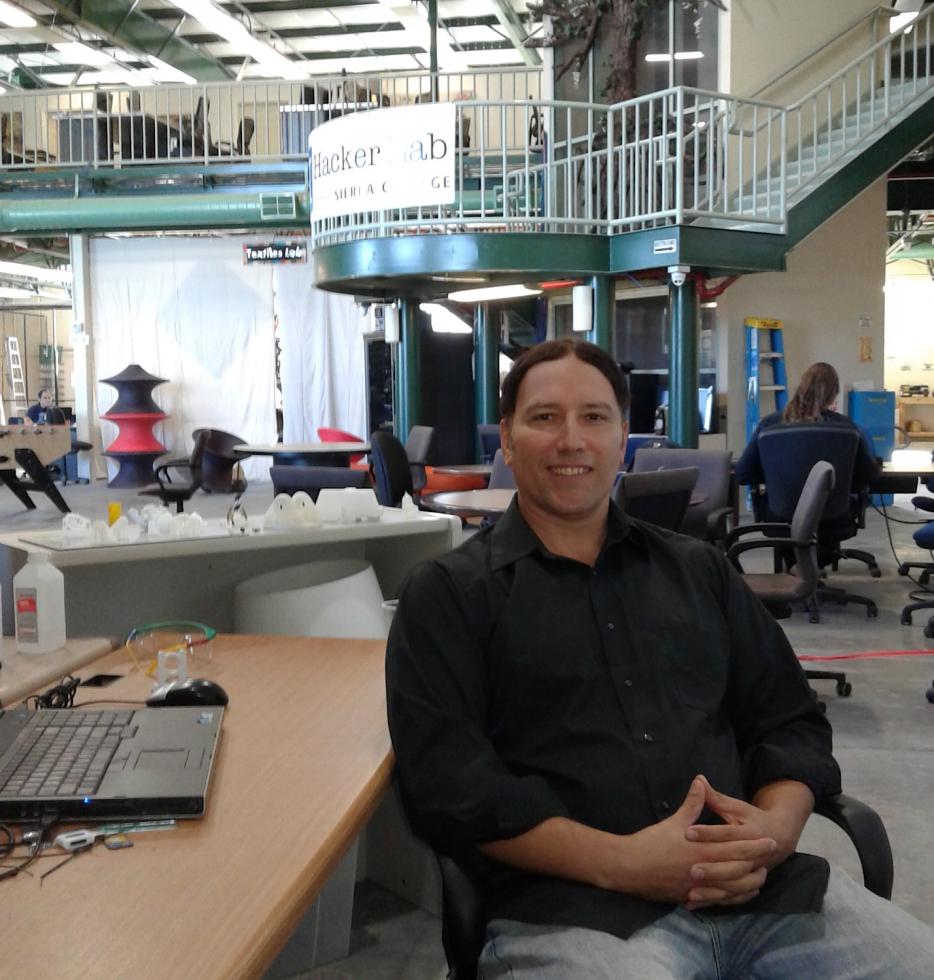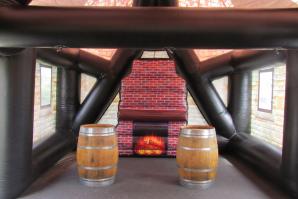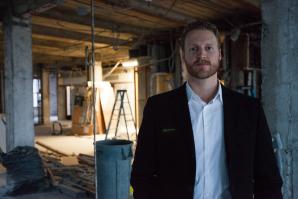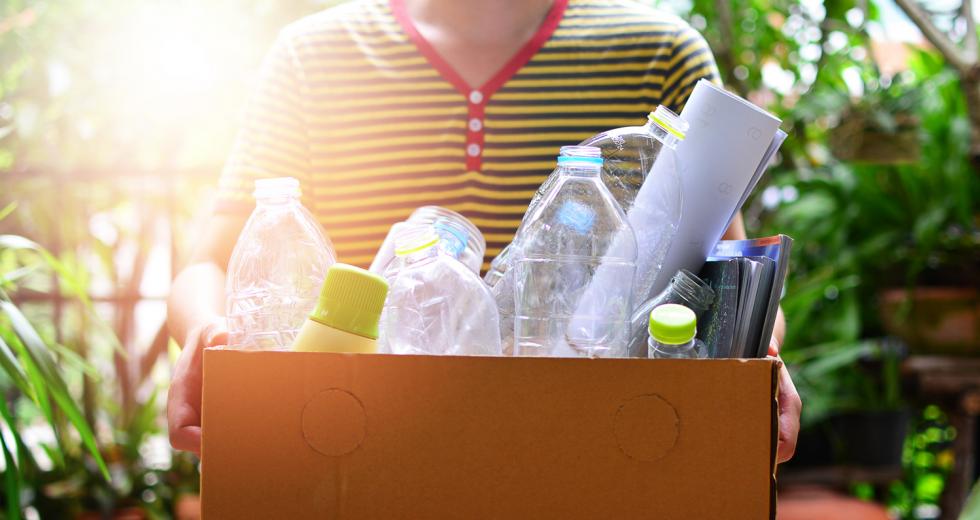The big idea was garbage.
Frederick Janson was in the garage, taking the trash out of his first house in North Natomas. That was when he noticed how full the blue recycle bin was with plastic containers. He realized these recyclables he was paying somebody to take away could be used as building materials.
Why was this a big deal? Well, let’s backtrack to 2013. Janson had just completed his design of a 3D-printed water purification device, which used heat to separate salt from water. He called the invention Aquapura. He printed his first prototype at the Sacramento Public Library on Marconi Avenue. The machine worked, he says, “separating drinkable fresh water out of dirtied salt water, which I tested and drank without incident.” With this device, he believed he could solve the world’s water crisis, giving clean water to two billion people.
Then he found out the cost: $400 to 3D print a banker box-sized unit.
“I knew that this was not at all a feasible venture, given that clay solar stills online were selling for a tenth of the price,” he says, referring to devices that use the sun to evaporate a liquid mixture, then separate salt or dirt to generate purified water.
He adds that product designers wanted $10,000 to $50,000 to mass produce the device. Janson had three degrees and experience as a researcher at the Stanford University School of Medicine, but he didn’t have capital.
In 2014, Janson set out to raise $55,000 via Kickstarter to print a system big enough to provide drinkable water to a community. Days later, with four backers pledging a total of $29, he canceled the campaign to avoid trademark infringement after he learned of another water company with a similar name.
But then his epiphany to use trash as cheap building material inspired him to go a different route.
He filed his first provisional patent and trademark that year for what he calls “the biblical Manna Machine on steroids,” a recycling-manufacturing machine for homes and offices, which would be able to turn meltable garbage into virtually any 3D object. The machine is still under development through 2018.
For example, recently, Janson’s wife dropped the water container for a $50 humidifier, and a piece of plastic broke off, making it useless. With a 3D file of the original, he says, they could potentially load the broken plastic piece (or any meltable plastic) into the side of this machine and recreate the water container without having to buy a brand new humidifier.
Frederick Janson, inside the Hacker Lab in Rocklin, is the
founder of Alphapura Robotics. (Photo courtesy Frederick Janson)

Janson named the new business Alphapura. This year, Alphapura was one of 14 startups accepted into Impact Venture Capital’s accelerator boot camp. The eight-to-10 week course teaches early-stage companies how to grow, scale and build to tackle global challenges in four categories: sustainability, health care, food and agriculture, and civic technology.
Alphapura fit perfectly into the sustainability bucket, says Aaron Anderson, principal at Impact Venture Capital. The boot camp was also a perfect fit for Janson, who is highly educated with a strong technical background, but could benefit from the business education piece.
Related: Impact of New Technologies Measured in Social Value
“We saw his technology chasing a lot of different problems,” Anderson says. “Our goal was to help him home in, focus on one problem in the early stage. If you try to boil the ocean, you’re not going to be particularly successful.”
The technology works by grinding cleaned and sorted meltable garbage into a homogenous grain, which gets turned into a molten stream. Janson says the stream can then be used to create more than 700,000 different 3D shapes, products and/or prototypes. These tools, he says, have the potential to disrupt the $5.1 billion 3D printing market by cutting out the costly consumables needed to print. It also makes the 3D-printing process more user-friendly through artificial intelligence, which guides users in a step-by-step manner.
To date, he says, Alphapura has raised under $100,000 from private funding. Generating enough capital, along with securing various IP and developing the prototype, present the three biggest challenges, he says. The team is in place, but Janson realized without a working prototype, crowdfunding likely wouldn’t be successful.
“In an impossible circular argument, we needed funds to develop our product, but we needed a product to develop funds,” he says, “the first challenge of many innovators.”
It also took Janson some time to find a U.S. vendor to make the crucial recycling component. But after a vendor in Germany turned out to be a bust, he found one in Silicon Valley. Currently, Alphapura has an advisory board and prototyping team of about 30, mostly advisors or independent contractors. Next year, he hopes to hire 1,200 people in Sacramento.
The revenue model would focus on online sales of the machine, he says, which would allow the company to get capital ahead of filling orders. Once the patents clear, Janson expects to start selling Alphapura machines within the year.
“The promise of this technology is so great that it could change how and where the world’s people get the products they need to survive and grow,” Janson says. “Imagine taking something in your home you don’t want or that is broken and turning it into a new product you need instead of buying the same at the store, and instead of contributing to global pollution.”
Editor’s Note: This story has been updated to more accurately reflect Alphapura’s working relationship with its team.
Do you know an entrepreneur who has what it takes? Recommend their company for our “Startup of the Month” here.
Recommended For You

Startup of the Month: Shenanigans Inflatable Pubs
With Irish imports, family business taps into inflatable pub trend
Inflatable Pubs can be rented for corporate events, weddings, birthday parties or any other type of festivity. Prices range from $400 to $600 per day with additional shipping fees for deliveries outside the region. Right now, Shenanigans has two inflatable pubs, imported straight from Ireland.

Startup of the Month: Fantag
With on-demand instant replays, spectators can watch live games from different shots
For sports fans, it’s not about wins and losses, but how you experience that game that counts. Brian Dombrowski learned this shooting videos for youth and high school sports events in the Bay Area. He was filming original content for coaches, but they weren’t the only ones interested in his footage.



